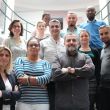Monitoring and Evaluation development projects: essential skills for development co-operation
A group of participants from all over the world working in development co-operations completed a 1-week Monitoring and Evaluation in Development Projects Executive Program at MSM on Friday, 24 April 2015.
The course is based on the unique experience of Maastricht School of Management. For more than 60 years, MSM has been involved in capacity building, education and training in developing countries to an extent that is unparalleled in the Netherlands.
The Monitoring and Evaluation of Development Projects Executive Program was developed as a response to the growing call for accountability in development co-operation and foreign aid programs. Companies and NGO’s involved in project implementation are required by donor agencies (for example the United Nations, European Union and DFID to name a few) to show evidence of their capacity. Monitoring and Evaluation (M&E) systems have become a requirement in donor funded development projects. Donors have their own M&E systems and companies and NGOs have to tailor their own systems adapting to specific donor requirements when answering to calls for tenders and calls for proposals.
During 5 sunny days in Maastricht, participants built a monitoring and evaluation system for a real project by applying the 4 pillars of an M&E system: the logic model, indicators, the information flow of the system and assumptions and risks. They also received a broad overview on different donor methodologies and trends in development evaluation.
 Guest lecturers from different fields contributed to the program: professional athlete and entrepreneur Tunde Leidsman talked about the use of monitoring and evaluations in sports. MSM MBA student Mahendra Subedi from India presented his NGO’s involvement in the mid-day meal project in India, the world largest school feeding program, and how monitoring led to substantial changes in their approach. Heinz Greijn, seasoned project manager, spoke about a survey on M&E experiences recently carried out in the Netherlands amongst a large group of development practitioners from NGO’s where it became clear that most NGO’s use M&E for upward accountability, but that M&E findings can be used for so much more, in particular to increase organizational learning, which will, ultimately, lead to increased effectiveness in development interventions.
Guest lecturers from different fields contributed to the program: professional athlete and entrepreneur Tunde Leidsman talked about the use of monitoring and evaluations in sports. MSM MBA student Mahendra Subedi from India presented his NGO’s involvement in the mid-day meal project in India, the world largest school feeding program, and how monitoring led to substantial changes in their approach. Heinz Greijn, seasoned project manager, spoke about a survey on M&E experiences recently carried out in the Netherlands amongst a large group of development practitioners from NGO’s where it became clear that most NGO’s use M&E for upward accountability, but that M&E findings can be used for so much more, in particular to increase organizational learning, which will, ultimately, lead to increased effectiveness in development interventions.
After an intensive week it is clear that M&E in development projects remains a challenging and dynamic field but the current developments are promising: Efforts to collect more (and especially higher quality) data and making this data available to a variety of actors (besides the donor community) such as civil society, governments, beneficiaries and the media will replace the question “Does aid matter?” by “How can aid matter even more”?
Related reading
Monitoring is about Performance: Management Lessons from Athletics
From Peru to Maastricht: International MBAs immersed in international business
MSM’s course in Managing Sustainable Development makes a change in Afghanistan
Clean energy for education and health: MSM’s Executive Education makes an impact

